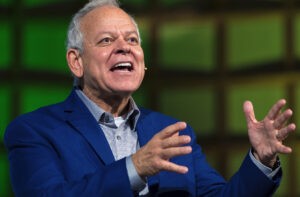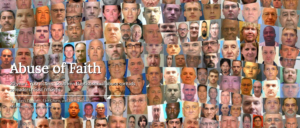This May, the Southern Baptist Convention felt shockwaves when a nearly 300-page report was published by a third-party investigative firm documenting systematic coverups of sexual abuse within the denomination. In the report, former SBC President Johnny Hunt was accused of committing sexual assault in July 2010 as he ended his two-year presidential term.
Hunt happens to be my former pastor.
I attended Johnny Hunt’s church in Northwest Atlanta — First Baptist Church Woodstock — as an infant until I graduated from high school, from 1991 to 2009. I grew up in that church. FBC Woodstock was my community. My family attended every week for Sunday school, Sunday morning service, Sunday evening service and youth group on Wednesdays.

Johnny Hunt
At church, we were told regularly that FBC Woodstock held a lot of influence, and that was substantiated by what I saw. Hunt was elected as SBC president in 2008 and 2009, becoming an even more prominent megachurch pastor within the SBC. FBC Woodstock has strong connections with the SBC’s North American Mission Board, which supports SBC missionaries and pastors.
‘Ministers in crisis’
At FBC Woodstock, Hunt led a ministry for pastors called Timothy + Barnabas, which housed a subsidiary project Hunt often spoke about during Sunday services — City of Refuge. Hunt would bring pastors to the church stage, sometimes with their wives and children, and then lead the church in prayer for them because they were in the midst of what he called a “crisis.” Details of these crises were not provided, but the church was made aware that when pastors from other churches had fallen on hard times, needed a sabbatical or needed counseling, they had a place to stay at FBC Woodstock.
Sometimes pastors took more than a year to graduate from City of Refuge while they received “counseling” for their unnamed issues. Many success stories were given over the years of pastors being “restored” to ministry and being accepted to new ministry positions within our network of churches, which expanded beyond the state of Georgia.
I did not realize growing up that Hunt’s Timothy + Barnabas City of Refuge program had such a wide reach. I heard Hunt speak about the program during church on Sunday, but he also wrote about City of Refuge in his books, during speaking engagements and on religious television shows. According to Hunt’s book Unspoken, City of Refuge was in operation for more than 20 years, from the late 1990s through 2018.
“The City of Refuge team was receiving 200 applications a year for the program, but only 10 openings were available each year.”
In a Baptist Press article from 2013, the North American Mission Board announced its partnership with FBC Woodstock to expand City of Refuge to other cities. The City of Refuge team was receiving 200 applications a year for the program, but only 10 openings were available each year. A main concern for NAMB was pastoral attrition. After investing time and resources into building up pastors, the City of Refuge was a possible solution for keeping “pastors in crisis” within the fold.
Some City of Refuge attendees like Troy Haas graduated from the program and went on to create their own ministries while serving as counselors within FBC Woodstock’s City of Refuge. Haas’ ministry, HopeQuest, which was founded in 2004 and is still in operation, models itself after City of Refuge as a residential program for pastors who struggle with addictions, including alcohol, drug and “sex addictions.”
What was the extent of these ‘moral failures’?
I remember the term “pastors in crisis” was predominantly spoken at my church, but in print many others were used to describe terminated SBC clergy who came to FBC Woodstock. Church leaders at FBC Woodstock referred to them as “fallen ministers,” and Baptist Press called them “hurting pastors.”
When discussing reasons for clergy termination within the SBC, the term “moral failure” often was used for a wide range of issues. One article said a moral failure could be gossiping, while others from the SBC linked moral failure with extramarital affairs and the National Sex Offender Registry. While gossip and extramarital affairs are not against the law, they are considered sinful within the Southern Baptist church. But a “moral failure” that could be associated with the National Sex Offender Registry (such as possessing child pornography or sexually abusing a minor) is a criminal act and should be reported. If this subset of “moral failure” is kept quiet within the church or covered up, that makes all involved within the coverup complicit to a crime.
“When discussing reasons for clergy termination within the SBC, the term “moral failure” often was used for a wide range of issues.”
In 2017 on Pat Robertson’s 700 Club, Hunt gave more details about pastors who would open up to him about their failures.
Hunt: “I could tell you that there’s people in jail right now — ministers — that got into pornography and then led to child pornography and then they were arrested and they’re facing long sentences.”
Robertson: “Wait a minute, ministers?”
Hunt: “Ministers, as in ministers of the gospel.”
Robertson: “And you know them personally?”
Hunt: “I know them personally.”
Robertson: “You do?”
Hunt: “Yes.”
Robertson: “And they got into child porn and then they wound up getting arrested for that?”
Hunt: “We have a ministry called City of Refuge — James Dobson years ago said it’s the most complete ministry within the local church he’s ever seen. I have like eight pastors and families right now that Woodstock is literally taking care of. We furnish housing for them, furnish jobs for them, help them pay their bills so they can keep their testimony above water, and we have a full counseling ministry to help bring them back to health in their marriage and in their home and with their children and with their relationship with God. So as a result of having this type (of) ministry, when you can get a person in a safe place — it’s like peeling the onion — they’re willing to tell you just what’s been going on in their life. So, it’s in that context that a lot is discovered.”
Transition at FBC Woodstock
In August 2018, Hunt announced his departure from FBC Woodstock after 32 years as senior pastor. He would transition to a role as senior vice president at NAMB, which has headquarters near Woodstock in Alpharetta, Ga. The agreement between Hunt and NAMB was solidified as a package deal — along with Hunt came his longtime colleague Jim Law as well as his Timothy + Barnabas pastoral care ministry.

Coincidentally, when Hunt officially transitioned to NAMB in January 2019, the first installment of a six-part series called “Abuse of Faith” was published by the Houston Chronicle. This series detailed public records citing 218 known sexual predators and 700 known abuse victims within the SBC’s church base from 1998 to 2018. Over the next six months, the series highlighted patterns of coverup within the SBC and denial of responsibility by senior leadership to hold their church base accountable.
In the 2008 SBC annual meeting when Hunt was elected president, advocates proposed that SBC leadership keep a database of sexual predators within the SBC and put a stop to churches that harbored or hid abusers. Days later, all such reforms were rejected.
By January 2019, a changing of the guard had occurred at FBC Woodstock. A new pastor was named, and new staff members were hired. Counselors and employees formerly associated with City of Refuge changed their titles. Hunt no longer mentioned the City of Refuge program on his social platforms. City of Refuge no longer was mentioned on the First Baptist Church Woodstock website or on the NAMB website. Baptist Press still has one article referencing City of Refuge in its online archives.
“Since Hunt’s resignation from NAMB, the organization’s website has been scrubbed of Timothy + Barnabas branding.”
Until recently, NAMB hosted the Timothy + Barnabas ministry for pastors on its website. Since Hunt’s resignation from NAMB, the organization’s website has been scrubbed of Timothy + Barnabas branding, although many of the same programs are still offered. As of June 2022, the 700 Club interview between Hunt and Robertson is no longer visible to the public on YouTube and is set to private.
More investigation needed
As the SBC faces a moral reckoning over past coverups of sexual abuse in churches, a logical next step would be to scour the records of First Baptist Church Woodstock’s City of Refuge and affiliated ministries and publicly disclose pastors with “moral failings” who were admitted for the sexual abuse of children or adult congregants.
NAMB’s involvement with City of Refuge raises questions regarding funds provided for the housing, counseling and child care needs of the hundreds of pastors and families who moved to Woodstock over the course of two decades. How many of those “fallen ministers” were guilty of abuse that was never reported and were never convicted?
NAMB should disclose its financial records involving City of Refuge and other pastoral restoration ministries because “moral failings” has proved to be a misleading term that glazes over serious issues that need to be swiftly addressed.
To quote Martin Luther King from his “I Have a Dream” speech: “We will not be satisfied until justice rolls down like waters and righteousness like a mighty stream.”
Joanna Sullivan is a writer and photographer living in New York City. She documents cultures through reportage photography and has published photo essays and articles with independent publications. She has been investigating evangelical Christianity for the past decade — digging into her personal experience with Christian segregation academies, Southern politics and a lack of separation between church and state. She is a graduate of the University of Georgia Grady College of Journalism.
Related articles:
Guidepost report documents pattern of ignoring, denying and deflecting on sexual abuse claims in SBC
Former SBC President Johnny Hunt admits improper conduct but denies abuse claims


